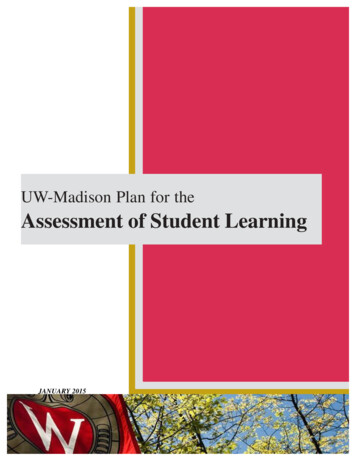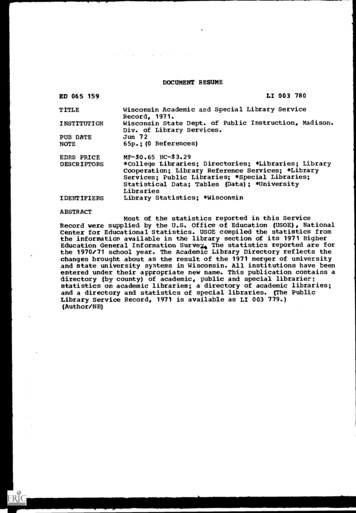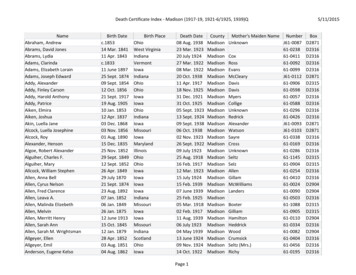
Transcription
UW-Madison Plan for theAssessment of Student LearningJANUARY 2015
This document describes a strategicand systematic process of improvingthe quality of degree and co-curricularprograms at UW-Madison through theassessment of student learning. UWMadison’s plan for assessing studentlearning is dynamic and grounded inthe university’s mission and strategicplan.
A. IntroductionThis institution-wide assessment plan provides a framework for student learning assessment at theUniversity of Wisconsin-Madison. To ensure the quality of our students’ experience, we engage inongoing, systematic and integrated efforts to better understand and improve learning. This is what we meanby student learning assessment. Others may refer to this concept as evidenced-based learning. In any case,student learning assessment is the ongoing process of: 1) defining clear, measurable learning goals, 2) ensuringthat students engage in sufficient learning experiences to achieve these goals, 3) gathering evidence todetermine how well student learning matches our expectations, and 4) using the results to validate or improvelearning.B. Overview and Guiding Principles of Student Learning AssessmentUW–Madison adopts the philosophy that assessment of learning should be an integrated, ongoingcomponent of academic life and the student experience. Student learning takes place both within andoutside of the classroom, and UW-Madison promotes assessment of student learning across students’educational experiences. To this effect, UW-Madison considers the following guiding principles ofassessment: Many of the regular activities of academic life are evaluative; when approached from asystematic perspective, they are forms of assessment. Student learning assessment supplements and supports (rather than replaces) curricular,departmental, and other types of ongoing review for program evaluation and improvement. Student learning assessment informs decision-making across several levels: institutional,school/college, division, department/program and course-level, and is especiallyinformative at the course and program level where the learning experience is mostimmediate. Student learning assessment is ongoing, periodic and iterative; it is used both as a procedurefor promoting and maintaining program excellence as well as for answering new questionsabout students’ educational experiences as those questions arise. Academic student learning assessment activities are faculty driven, and are primarilyorganized at the program (major, degree, certificate, course) level. Collaboration between academic departments and co-curricular programs is stronglyencouraged to identify and align opportunities for assessing student learning across thestudents’ educational experience.C. Framework for Student Learning AssessmentAt UW-Madison, the Wisconsin Experience serves as anoverarching framework across all academic and cocurricular programs for what is expected during a student’stenure Through the Wisconsin Experience and guided by aset of learning goals referred to as the Essential LearningOutcomes (ELOs),1 UW-Madison seeks to develop instudents the ability to engage in the world, to be creativeUW-Madison Essential LearningOutcomes-Knowledge of Human Cultures and thePhysical and Natural World-Intellectual and Practical Skills-Personal and Social Responsibility- Integrative Learning1ELOs were developed from several national surveys done by the Association of American Colleges & Universities (AAC&U) withemployers, faculty, staff and alumni, asking the question, “What qualities and skills do you want in college graduates?”3
problem solvers, to integrate empirical analysis and passion, to seek out and create new knowledge andtechnologies, and to adapt to new situations. The nature of these opportunities and how they are offered--- through the integration of student centered in-class and out- of-class learning experiences which arecharacterized by active and engaged learning --- exemplifies the Wisconsin Experience and what isexpected of UW-Madison graduates. (See UW-Madison Essential Learning Outcomes, Appendix A.)D. Guidance and OversightFaculty, academic departments, and schools/colleges are responsible for developing and implementingthe curricula. As such, schools/colleges have appointed committees (such as academic planning andcurricular committees) who regularly meet to review the curriculum and consider the results ofassessment activities when developing suggestions for program improvement. Establishingdepartmental and co-curricular assessment plans helps to streamline this process and ensures anevidence-based approach to program quality.The Office of the Provost, the University Council on Academic Affairs and Assessment (UCAAA)2,and the deans’ offices of the schools and colleges are jointly responsible for student learning assessment.Together these units collaborate to provide oversight and support for assessment activities.The Office of the Provost maintains a StudentLearning Assessment website intended for thoseat UW–Madison who lead or engage inassessment activities. The site serves as aresource for individuals to access informationon activities around and best practices withinthe assessment of student learning. The Officeof the Provost also provides professionaldevelopment workshops and consultation toschools and colleges and other units to ensurestudent learning assessment is supported and anintegral component of academic and cocurricular planning.E. Conducting Student Learning AssessmentConducting ongoing and systematic evaluation of student learning is an integral component of high-qualityacademic and co-curricular programs. At UW-Madison, student learning assessment considers whatstudents are expected to learn, where in the curriculum these learning experiences are provided, how it isknown that students are learning, and how and when evidence of learning is utilized to validate or makeimprovements to programs.As such, every academic program is expected to have active assessment plans in place, conduct at least oneassessment activity each year and report annually to the Office of the Provost, including plans forimprovement.2The UCAAA, made up largely of school/college associate deans, meets periodically each academic year to discuss issues related toacademic planning, programs, and policies including accreditation, assessment, curricular development, reporting strategies, and otheremerging educational trends.4
Specifically, assessment plans should specify at least 3-5 learning goals, identify assessment strategies to determinehow students are meeting these learning expectations. Assessment reports include a review and summary of thefindings. A Basic Assesment Plan for academic programs is intended as a guide for program faculty andstaff who are developing their assessment plans.Program faculty and staff are required to utilize at least some direct measures of student learning (embeddedquestioning, capstone assignments evaluated with rubrics, standardized testing, portfolio reviews, etc.). Theymay also make use of indirect methods (surveying graduating students, alumni and employers, etc.) of assessment todocument whether or not students meet the stated learning goals. Indirect methods are often seen as easier touse but they must be complemented by direct methods.F. Institutional AssessmentThe assessment of student learning goals at the program level also informs institution-level assessmentactivities. The Office of the Provost, the Vice Provost for Teaching and Learning, and the Office ofAcademic Planning and Institutional Research coordinate institution-level activities, includingadministration of the National Survey of Student Engagement and the Post-Graduation Plan Survey,and other institution-level assessment efforts in accordance with UW System and Board of Regentpolicies and accreditation standards set forth by the Higher Learning Commission. Institutional effortsalso include ongoing and systematic documentation of the Wisconsin Experience and the EssentialLearning Outcomes.G. Assessment of General Education ProgramUW-Madison’s General Education assessment reflects further institution- level assessment of studentlearning. The general education program was created to ensure that every baccalaureate student at UWMadison acquires the foundation of an undergraduate education which includes elements for living aproductive life, being citizens of the world, appreciating aesthetic values, and engaging in lifelonglearning in a changing world.UW-Madison’s General Education includes four foundationaldomains for undergraduate education: Breadth Communication Ethnic Studies Quantitative ReasoningThese foundational domains provide for breadth across the humanities and arts, social studies, and naturalsciences; competence in communication, critical thinking and analytical skills appropriate for a universityeducated person; and investigation of the issues inherent to living in a culturally diverse society. Importantly,UW-Madison’s General Education program aligns with the Wisconsin Experience and Essential LearningOutcomes framework, especially as it relates to providing students with foundational intellectual and practicalskills.The University General Education Committee (UGEC) oversees the campus-wide undergraduate generaleducation program, management of its requirements and assessment of the general education student learningoutcomes, and reports to shared governance through the University Academic Planning Council.5
H. Graduate Level Student Learning GoalsThe Graduate School and the Graduate FacultyExecutive Committee (GFEC) exercise theauthority of the graduate faculty with respect toestablishing, reviewing and modifying graduatedegree programs, named options, doctoral minors,graduate/professional certificates, and capstonecertificates. As part of its duties, GFEC, incollaboration with the Graduate School leadership,engages in strategic planning discussions. Suchdiscussions include articulation of broad graduatestudent learning goals that may be modified andextended by academic programs. In Fall 2014the Graduate School and the Graduate Executive Committee adopted a set of graduate levellearning goals appropriate to distinguish a graduate education from the undergraduateexperience. Assessment of student learning at the graduate level is, ultimately, articulated andcarried out in the individual academic programs (UW-Madison Graduate Learning Goals, AppendixB.)I. Requirements for Student Learning AssessmentProgram-level AssessmentUW-Madison offers a wide range of academicAcademic Program Requirements for Studentprograms at various levels (includingLearning Assessmentbachelor’s, master’s, certificate, professional,and doctoral levels) and within many differentAll academic programs (major/degree/co-curricular)areas of specialty. Each degree program iswill:expected to articulate and adopt studentlearning goals, identify where in theArticulate student learning goals.curriculum the learning takes place andSpecify where in the curriculum learningdevelop assessment plans that align with thesetakes place.learning goals. Further, each academicDevelop an assessment plan to evaluateprogram is expected to engage in at least onewhether or not students are meetingexpectations of learning.assessment activity each year, report findings,Engage in at least one assessment activity perand develop improvement plans as needed.year; that is, at least one of a programsPriority should be given to activities based onstudent learning goals will be evaluated eachdirect measures of student learning.year. At least some activities must be based in(See the UW-Madison 2015-17 Timelinedirect measures of learning.for Program-level Assessment, App. C).Review the results of a nnual st uden tCo-curricular AssessmentCo-curricular life plays an important role inthe student experience at UW-Madison.Students engage in activities that highlight,integrate and enhance formal academiclearning. As such, assessment planning alsoincludes the identification of the range of cocurricular educational experiencesl e a r n i n g assessment an d utilize findings toinform curricular and co- curricular planningand consider ways that academic programs canmore effectively help students learn.Program faculty/staff are required to documentassessment activity, and annually report to theOffice of the Provost.6
through which students demonstrate learning. Thus, co-curricular units and programs set prioritiesincluding learning goals, assess these goals and report on progress annually.In addition, academic departments are encouraged to collaborate with co-curricular programsto identify instances in which students demonstrate learning related to the articulated programlevel learning goals. Assessment activities designed around these out-of-classroomexperiences are included in the program’s annual assessment report. For example, studentleadership activities, student governance work, or volunteer opportunities in which studentsmeet intended learning expectations often support academic learning goals.Course-level AssessmentFaculty are responsible for guiding and monitoring student learning throughout the academic programbeginning at the course level. When designing new courses or planning current offerings, faculty establishcourse goals and course-level student learning outcomes which advance some aspect of the academic programoutcomes. All courses offered at UW-Madison must have course syllabi with course objectives and studentlearning goals clearly articulated. Information about the UW-Madison course approval process can be foundon the Academic Planning and Institutional Research website.Courses are the unit in which most students directly experience academic programs and are the buildingblocks of much of the academic experience. In addition to an expectation for academic programs to havelearning goals, for-credit courses are also expected to have learning goals. Faculty are required to articulatein their syllabus what they expect students to learn (to know or be able to do) from the course. The learninggoals for courses should align with and accumulate to a full set of learning goals for the academic program.J. Academic Planning and ReviewUW-Madison has a long history of conductingregular review of academic programs as outlinedin the UW-Madison Academic Program ReviewGuidelines. Academic programs must bereviewed at least once every ten years underUniversity Academic Planning Council (UAPC)policy, and Board of Regents policy. All newacademic programs must be reviewed five yearsafter implementation. The purpose of programreview is to examine strengths and challenges, tocelebrate accomplishments, and to reflect on,and plan for, the future. Program review is aplatform for exploring ways to maintain andenhance the academic quality of a rangeof academic activities. This review should be a natural outcome of an on-going, program-levelassessment process. A plan for assessing student learning and the student experience is required aspart of the new program proposal and is expected to be implemented with the initiation of theprogram. Program review is to be student-focused and, through r e g u l a r assessment activities,report on issues related to student learning and the student experience.More information about the program review process can be found on the Academic Planning andInstitutionalResearch Website .K. UW-Madison Selected Resources for Assessment7
UW-Madison Student Learning Assessment website – https://assessment.provost.wisc.eduCollege of Letters & Science Example – https://kb.wisc.edu/ls/page.php?id 25242General Education at UW-Madison – https://gened.wisc.edu/Undergraduate Program Profile (trends in degrees, enrollments, time-to-degree, by major) –http://apir.wisc.edu/students.htmUndergraduate Post-Graduation Plans Reports – see the web page for standard reports and how to requestprogram-specific requests – http://apir.wisc.edu/pgp.htmNational Survey of Student Engagement (NSSE) – major-specific reports by request to Academic Planningand Institutional Research – pted by the University Council for Academic Affairs and Assessment, January 30, 20158
Appendix AUW-Madison Essential Learning OutcomesAt UW-Madison, we have adopted the AAC&U Essential Learning Outcomes (ELOs) as our overarching undergraduate learning goals. The ELOs describe a core set of skills, abilities andknowledge that align with our values to develop extraordinary national and global leaders. Theselearning goals were developed by AAC&U through extensive national surveys and interviews donewith employers, faculty, staff, and alumni, asking the basic question, "What qualities and skills doyou want in college graduates?" These outcomes include:Knowledge of Human Cultures and the Physical and Natural World Through study in the sciences and mathematics, social sciences, humanities, histories,languages, and the artsFocused by engagement with big questions, both contemporary and enduringIntellectual and Practical Skills Inquiry and analysis Critical and creative thinking Written and oral communication Quantitative literacy Information, media, and technology literacy Teamwork and problem solvingPracticed extensively across the curriculum in the context of progressively more challenging problems,projects, and standards for performancePersonal and Social Responsibility Civic knowledge and engagement -- local and global Intercultural knowledge and competence Ethical reasoning and action Foundations and skills for lifelong learningAnchored through active involvement with diverse communities and real-world challengesIntegrative Learning Synthesis and advanced accomplishment across general and specialized studiesDemonstrated through the application of knowledge, skills, and responsibilities to new settings and complexproblemsAdopted by UW-Madison University Assessment Council, April 20089
Appendix BUW-Madison Graduate Learning GoalsMaster’s LevelIntroductionKnowledgeand SkillsAll UW-Madison students enter theGraduate School’s graduate programswith at least a bachelor’s degree.Graduates obtaining a master’s degreefrom the Graduate School, whether itbe a research-based, project-based, orcourse-work-only master’s degree, areexpected to achieve the followinglearning goals by the end of theirdegree work. ProfessionalConduct Doctoral LevelRegardless of whether an individual isawarded a master’s degree, the doctorallevel learning goals are inclusive of themaster’s level learning goals. Researchbased doctoral programs culminate in adissertation.Professional doctoral programs culminatein a project or performance. Additionally,students receiving a doctoral degree fromthe Graduate School in both researchbased and professional programs areexpected to achieve the followinglearning goals by the end of their degreework.Articulates, critiques, or elaboratesthe theories, research methods, andapproaches to inquiry or schools ofpractice in the field of study.Identifies sources and assemblesevidence pertaining to questions orchallenges in the field of study.Demonstrates understanding of theprimary field of study in ahistorical, social, or global context.Selects and/or utilizes the mostappropriate methodologies andpractices.Evaluates or synthesizesinformation pertaining to questionsor challenges in the field of study.Communicates clearly in waysappropriate to the field of study. Recognizes and appliesprinciples of ethical andprofessional conduct. Articulates research problems,potentials, and limits with respect totheory, knowledge, or practice withinthe field of study.Formulates ideas, concepts, designs,and/or techniques beyond the currentboundaries of knowledge within thefield of study.Creates research, scholarship, orperformance that makes asubstantive contribution.Demonstrates breadth within theirlearning experiences.Advances contributions of the field ofstudy to society.Communicates complex ideas in aclear and understandable manner.Fosters ethical and professional conduct.Approved by the Graduate Faculty Executive Committee, December 14, 201410
CertificatesA certificate program is a designated set of for-credit courses focused upon a specific topic or theme. Thecertificates are distinguished by the enrollment status of students pursuing the certificates: GraduateCertificates are earned by students enrolled in a graduate program and Capstone Certificates are earned bypost- baccalaureate University Special (non- degree) students.Students receiving a Graduate Certificate are expected to achieve the learning goals at the master’s ordoctoral level and the following: Demonstrates an understanding of a body of knowledge focused on aspecific topic outside or as an extension of the major field of study.Students receiving a Capstone Certificate are expected to achieve the following: Articulates the keyconcepts, methodologies, or theoretical concepts in a specialized area of study.11
Appendix CUW-Madison Program-level Assessment Timeline, 2015-17January-June 2015 Provost’s Office and Graduate School coordinate on learning goal and assessment plandevelopment for undergraduate and graduate programs Provide workshops and consultation for program faculty and staffProvost’s Office begins collection of program-level learning goalsProvost’s Office develops a Request for Proposal for a campus-wide software solution tosupport course and program assessment planning, management and reportingJuly 2015 Deadline for undergraduate and graduate programs to submit learning goals to the Provost’s OfficeSeptember 2015 Graduate programs final opportunity to edit learning goals for the Graduate CatalogSeptember – December 2015 Begin collection of undergraduate and graduate program assessment plans Provide workshops and consultation for program faculty and staffJanuary – July 2016 Undergraduate programs final opportunity to edit learning goals for the Undergraduate Catalog Continue to develop and collect undergraduate and graduate program assessment plans Provide workshops for program faculty and staffJuly 2016 Deadline for undergraduate graduate programs to submit assessment plans and annual assessmentreports to Provost’s OfficeSeptember-May 2017 Continue to develop and collect program assessment plans Provide workshops for program faculty and staffJuly 2017 - ongoing All programs engage in at least one assessment activity annually and submit an annual report tothe Provost’s Office12
At UW-Madison studentlearning assessment is anintegral component ofacademic planning and isused to continuouslyenhance the quality of ouracademic programs and thestudent experience.13
carried out in the individual academic programs (UW-Madison Graduate Learning Goals, Appendix B.) I. Requirements for Student Learning Assessment Program-level Assessment UW-Madison offers a wide range of academic programs at various levels (including bachelor's, master's, certificate, professional,











